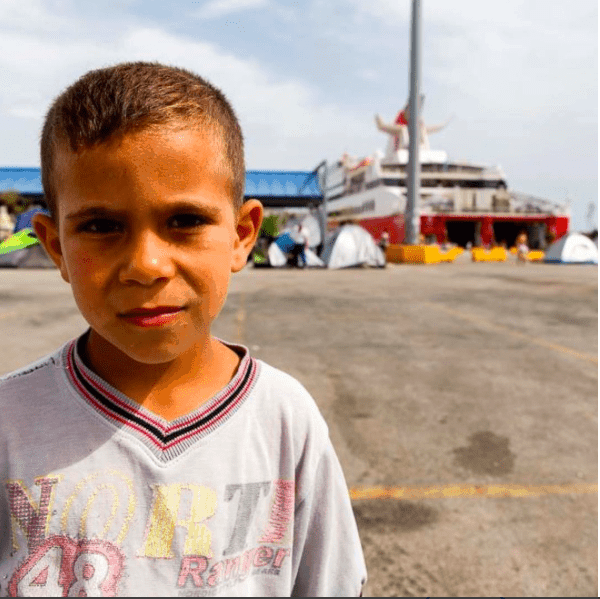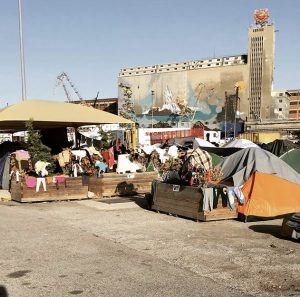 As any international tourist or Greek holidaymaker will confirm, Piraeus Port is magical and romantic. The hustle and bustle that occurs on Greece’s foremost maritime harbour as summer arrives is seared in the minds of those lucky enough to experience it.
As any international tourist or Greek holidaymaker will confirm, Piraeus Port is magical and romantic. The hustle and bustle that occurs on Greece’s foremost maritime harbour as summer arrives is seared in the minds of those lucky enough to experience it.
Piraeus port unfolds in vibrant colour and pulsates with energy. Amidst the cacophony of cars, buses, and stationary taxis (during the start of the economic crisis, yellow cabs were the literal canary in the coal mine), the port’s charm soon becomes self-evident.
The koulouria (Greek pretzel) sellers wheel their stands to the lip of the harbour and shout their prices; three-wheeler vans zip about laden with Aegina’s pistachios; containers are readied to enter the hull en route to Crete or Kythira. Ships of all sizes and styles provide the theatrical backdrop; ropes are fastened tight as ships jam against the rubber tyres bolted to the concrete pier.
Piraeus has maintained this charm ever since Melina Mercouri sang of the guys on the dock in ‘Never on a Sunday.’ Piraeus was a place of expectation, onward travel, and, naturally, romance.
Each year, some 40,000 ships operate in its harbour, servicing 20 million passengers, and each gate at the port signifies a gateway to the Aegean. At E4, Poseidon Hellas departs for nearby Agistri; E7 is bound for Mykonos, while at E8, the Flying Dolphin sets off for the boutique island of Hydra.
That’s the magic of Piraeus, but in the past 12 months, it’s been a place of refugees too. At the E1 and E2 gates tucked out of sight a virtual tent city has emerged. Refugees from war-torn zones, especially Syria, have fled to Greece after harrowing land journeys through Turkey and frightful sea crossings across the Mediterranean to reach Europe. Read their testimonies, and you’ll find resilient middle-class professionals fleeing bombs from the West, Islamic terrorism, drought or persecution as they arrive on Europe’s doorstep. *
Greece has become the corridor to this European dream, and the tent city in Piraeus is the first stage of life in limbo. Walking past the ‘Blue Star’ booths painted in bold blue and yellow, tents are huddled together beneath an overpass for shade. Graffiti reads “REFUGEES WELCOME, FRONTEX OUT!” beside the Pericleous Passenger Terminal. Here, a laundry line strung between poles is used by women still wearing their winter clothes (they arrived months before as they await their clearance papers to head further into Europe). These families are not ‘the wretched of the earth’ but are placed in a wretched situation.
The multi-coloured tents are strangely juxtaposed beside the cruise liners and artistic murals on dormant buildings depicting ancient statuary. At the foot of these buildings are the Greek Red Cross and drop-off collection points for bundles of clothing. At Gate E1, makeshift camper vans act as storage facilities for PRAKSIS, where pharmaceutical supplies are stacked by volunteers, brought in by your average Greek citizen or foreigner aware of the need for simple items like Aeroguard, calamine lotion, condoms, and band-aids.
Greek response to the humanitarian crisis that has washed up on its shores has been inspiring (Lesbos citizens have been nominated for the Nobel Peace Prize), which has acted as a foil to government designs to detain refugees in camps, be it in Idomeni on the Greek border to FYROM or else on the far-flung islands of Lesbos, Samos and Kos.
Of particular significance for us born down under is that right here was the site for Greeks departing for Australia in the heyday of post-war immigration
The Chandris Liners were the passenger ships that bridged Greece to Australia. There is no need to imagine the suffering of Syrians, Iraqis, or Afghanis; they sought shelter elsewhere to better their families and escape hardship. We might all like to forget our past traumas, but these have motivated migrants to succeed. Our parents were beneficiaries of this; giving refugees a second chance is vital and something Greeks know intuitively.
The numbers have dwindled from the winter peak; only a few hundred from the thousands remain at E1 and E2. But it’s worth noting Germany has opened the door to the refugee influx, given it has a pressing need for labour. German average age is the mid-40s; an ageing population will thus need young hands that robotics can’t replace and to tax workers to keep pace with its pensions. Europe is undergoing an existential crisis. In these small scale initiatives, Greeks are shining a light on their better angels.
Filotimo: Is it the key to surviving the age of loneliness?


 As any international tourist or Greek holidaymaker will confirm, Piraeus Port is magical and romantic. The hustle and bustle that occurs on Greece’s foremost maritime harbour as summer arrives is seared in the minds of those lucky enough to experience it.
As any international tourist or Greek holidaymaker will confirm, Piraeus Port is magical and romantic. The hustle and bustle that occurs on Greece’s foremost maritime harbour as summer arrives is seared in the minds of those lucky enough to experience it.